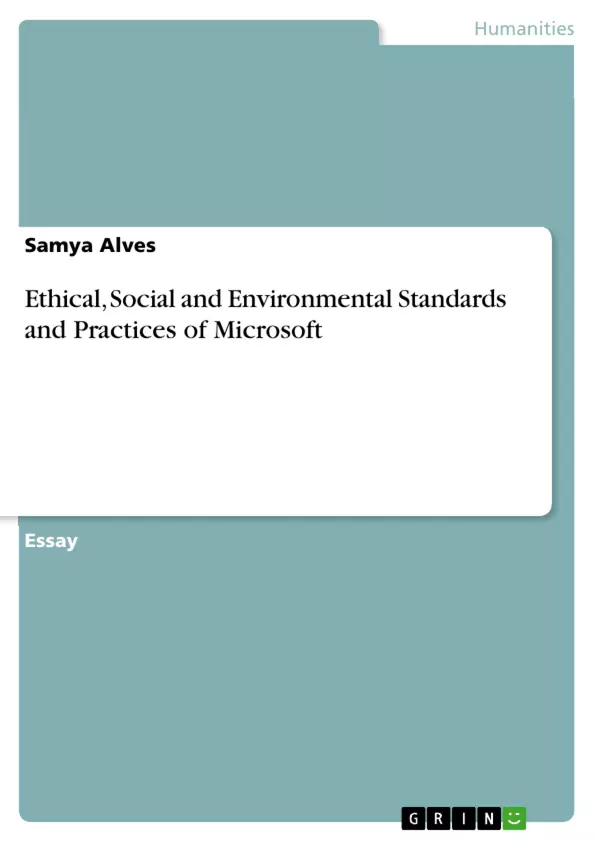Corporate Social Responsibility and its monitoring by governments, activists and the media have incorporated CSR into the daily activity of companies which desire to remain competitive in today’s market.
“Microsoft Wins 'Most Ethical' Award--Google, Facebook, Apple Don't Make The List” was the headline of Huffington Post and according to Ethisphere Institute, the award is presented to those companies who lead their industry in the ethics and compliance programs. The companies evaluated span several industries, from food to banking industries. A few examples of other companies that made the 110 most ethical list are Adobe, Cisco, eBay and Symantec. Companies are analyzed based on corporate social responsibility, citizenship, governance, innovation, social contribution and many others factors.
Ethisphere is an institution that entitles itself as the following:
“The Ethisphere® Institute is the global leader in defining and advancing the standards of ethical business practices that fuel corporate character, marketplace trust and business success. We have a deep expertise in measuring and defining core ethics standards using data-driven insights that help companies enhance corporate character. Ethisphere believes integrity and transparency impact the public trust and the bottom line of any organization.”
Microsoft started to make a big "corporate citizenship" push in the early 2000s following the negative fallout from its antitrust trials, and has since donated millions to non-profits, invested in programs for economic development, and tightened up its internal reporting processes. All of this was apparently enough to get the company on the list this year. Yet, that has not always been the case.
Table of Contents
- Introduction
- Microsoft's Values and Standards of Business Conduct
- Microsoft's Recent Philosophy
- Microsoft's Stakeholders
- Impact of CSR for Microsoft
- Considerations of CSR in Microsoft's Future
- Conclusion
Objectives and Key Themes
This text explores the evolution of Microsoft's ethical, social, and environmental standards and practices, focusing on how the company has shifted from its controversial early years to a more ethical and socially responsible organization. It investigates the role of corporate social responsibility (CSR) in Microsoft's recent success and examines how the company has integrated ethical values into its core operations.
- Microsoft's shift from its early controversial practices to a more ethical company.
- The impact of corporate social responsibility (CSR) on Microsoft's business practices and success.
- Microsoft's commitment to ethical values, including integrity, honesty, and accountability.
- The influence of key figures like Bill Gates in shaping Microsoft's ethical direction.
- The extension of Microsoft's ethical standards to its suppliers.
Chapter Summaries
- Introduction: This chapter introduces the concept of corporate social responsibility (CSR) and its growing importance in today's business environment. It highlights Microsoft's recognition of CSR and its journey to becoming an ethical company.
- Microsoft's Values and Standards of Business Conduct: This chapter outlines Microsoft's core values, including integrity, honesty, passion, and accountability. It also details the company's Standards of Business Conduct, which are designed to guide employees and ensure ethical behavior across all levels of the organization.
Keywords
The key themes and concepts explored in this work include corporate social responsibility (CSR), ethical business practices, corporate values, standards of business conduct, stakeholder engagement, sustainable development, and ethical leadership. The text also discusses key figures like Bill Gates and their influence on Microsoft's ethical transformation.
Frequently Asked Questions
How has Microsoft's approach to ethics changed over time?
Microsoft shifted from controversial practices and antitrust trials in the early 2000s to a strong "corporate citizenship" focus, investing millions in non-profits and tightening internal compliance.
What award did Microsoft receive from the Ethisphere Institute?
Microsoft was recognized as one of the "Most Ethical" companies, leading its industry in ethics and compliance programs, while competitors like Google and Apple did not make the list at that time.
What are Microsoft's core business values?
Microsoft's core values include integrity, honesty, passion, accountability, and respect, which are outlined in their Standards of Business Conduct.
What is the role of Bill Gates in Microsoft's ethical direction?
Bill Gates played a significant influence in shaping Microsoft's ethical transformation and its commitment to social contribution and global development.
How does Microsoft ensure ethics in its supply chain?
Microsoft extends its ethical standards and Standards of Business Conduct to its suppliers to ensure social and environmental responsibility across its entire operation.
- Quote paper
- Samya Alves (Author), 2015, Ethical, Social and Environmental Standards and Practices of Microsoft, Munich, GRIN Verlag, https://www.grin.com/document/309432



